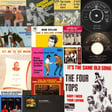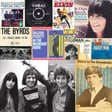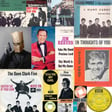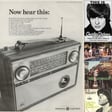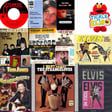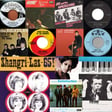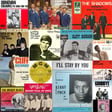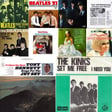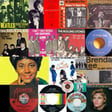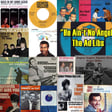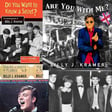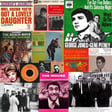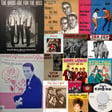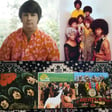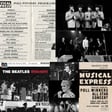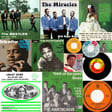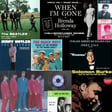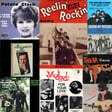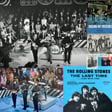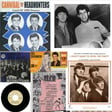Become a Creator today!Start creating today - Share your story with the world!
Start for free
00:00:00
00:00:01

June 1964 (side B)
Francoise Hardy, Peter and Gordon, Little Richard, The Swinging Blue Jeans, The Pretty Things and more versions of "Hello, Dolly!" than you might expect as we continue our four-sided odyssey for June. #MadeonZencastr
Recommended
Transcript
The Beatles' Motivational Chant
00:00:00
Speaker
The Beatles had this chant John Paul and George and probably then Stuart and Pete had this chant when things weren't going well which in their world wasn't very often because mostly it was an upward trajectory but nonetheless sometimes you know a bad night or the gig would you know didn't work properly or the amps broke or whatever I say where are we going fellas and they go to the top Johnny And I say, where's that fellas? And they say, to the top of most of the papa most. And I say, right. Then we'd all sort of cheer up. Now then, boys, where are we going? To the top, bro. Where's that? To the top of most of the papa most.
Exploring the British Charts
00:00:47
Speaker
Welcome to this week's Toppermost of the Poppermost. We are back with more of the British charts. This is the first time we've had to take the British charts over onto two sides. We are going to fill out a double album this time. Absolutely. Boy, this is big stuff, but we have so many songs to cover this month on the UK charts. So we're giving you a double the fun.
The Animals and 1960s Defining Song
00:01:11
Speaker
And in this episode, we're going to hear a song by the animals that is a defining moment of the 1960s. All right, we move on to the next week, the week of June the 9th.
UK Chart Movements
00:01:23
Speaker
At number 25 is Can't Buy Me Love. At number 28 is The Major Five with Mockingbird Hill. At number 29, Ramona by The Bachelors, which would move from number 29 to number 19 to number 12 to number six.
00:01:40
Speaker
Oh it's slightly catchy but this is very Lawrence. Well the vocals in the backing are just snooze inducing.
00:02:06
Speaker
My goodness, yeah. Lawrence Welk vocals is right. The song goes back to 1928 by Paul Whiteman and his orchestra. ah And it was actually composed for a 1928 feature film by the same ah
'Ramona' Enters Public Domain
00:02:25
Speaker
name. By the way, the original lyrics and music of the song entered the public domain in the United States this year. and Just this year, so we just made it in time To to cover it for this show all the backing vocals just repeating Ramona Ramona Ramona boy that got old fast and I'll introduce the first of a few Betty isms my mother for this show who just said that's a terrible song and
00:02:55
Speaker
But it's far from the worst song we're going to see this month. Oh, no, it's far from the worst, but she's got a one that stings more later on. I don't understand. This got to number six, huh? I don't think it's special. I mean, it's fine. It sounds so out of its time. You know, maybe the bachelors were more popular than we give them credit for. Yeah, I mean, maybe that's it. Maybe the nostalgia appeal. I
Jim Reeves' 'Ramona' Version
00:03:21
Speaker
don't get it. It wasn't even nostalgia in any kind of a clever way. Yeah, those backing vocals, just repeating Ramona, Ramona, Ramona. Boy, that got on my nerves. Yeah. There is a better version of this. I'm using finger quotes here or hand quotes. like There is a better version than this. The Jim Reeves version is better. Ramona, when day is done, you'll hear my call.
00:03:50
Speaker
Mona will meet beside the waterfall.
Cover Artists and New Contributions
00:03:59
Speaker
I could see that. I think what saves the Jim Reeves version is that he's doing dual guitar on it with his record producer Chet Atkins. Oh, interesting. Okay. So that little bit extra to it is that you've got both of those two doing the guitars together. And I think Jim's lower range, that sort of baritone voice that he's got gives it a different laid back edge that sort of works more than the dare I say sickly syrupy take by the bachelors sickly syrupy. I like that.
00:04:33
Speaker
Nicely put. At number 34, you're no good by the swinging blue jeans, which would move from 34 to 25 to 16 to 8. You know, we certainly talked about the original and we've talked about the Linda Ronstadt version before. This is much more straightforward pop. It is pretty much a beetle copy. That guitar, particularly that little gap there in there, tell me that he's not trying to imitate George Harrison. I'm gonna say it again. It's no good. It's no good. It's no good. Baby, it's no good. Mmm, no good.
00:05:20
Speaker
Mmm, absolutely. And how about the ooh at the end? Hey!
00:05:38
Speaker
The inflections of the lead singer,
Comparing Covers: Swinging Blue Jeans vs The Beatles
00:05:41
Speaker
I mean, it's yeah, this is definitely a Beatle imitation. I like the drums on this, but other than that, yeah, this does not match Betty Everett or Linda Ronstadt. It's fine, but it's just not, you can't compare it to either of those versions. Yeah. There are a couple of other covers that I want to mention. Elvis Costello covered it on the flip of the Veronica single, and it's a kind of a slightly different take on it.
00:06:16
Speaker
Feeling better, now that we're through. Feeling better, now I'm over you. I learned my lesson from the start. Now I know how you really are. You know good, you know good, you know good. Baby, you know good. That's true. I forgot about his version and that's, that's an interesting version too. And then just very recently on the Rockstar album, the same one that features Paul and Ringo on the cover of Let It Be, Dolly Parton did this with Emmylou Harrison, Sheryl Crow. Cool, girl power. There you go.
00:07:08
Speaker
Feeling better now that we're through Feeling better cause I'm over you I learned my lesson and left a scar Now I see how you really are You're no good, you're no good, you're no good Baby, you're no good
00:07:35
Speaker
You're no good, you're no good, you're no good, baby, you're no good. I still think the best version of this is Linda Ronstadt's version from 74. Yeah, it is a great version. Which was produced by Peter Asher. Mm-hmm. Oh, that's right. I remember Kit preferred the original. Yep. I prefer the original, but Linda's version is damn close. Damn close. Absolutely. We agree on that. Yeah. Have you seen the backing musicians on the rin Linda Ronstadt version kit? I don't think so. Eddie Black on guitar, Kenny Edwards on bass, and she's got the great Andrew Gold. 10cc connection there as well.
00:08:17
Speaker
And he plays on this electric piano, drums, percussion and the electric guitar solo on that Lindy Ronstadt version. That is Andrew Gold. wow He was her arranger, wasn't he, in the 70s? Oh my gosh, I didn't know he played that much on there. Wow, that's amazing. And Andrew Gold is one of the biggest Beatles fans you will find, which in the music industry is saying something. So Peter Asher and Val Gray and I stayed up one night, fairly late as I recall, doing this solo, which was just sort of this double-tracked George Harrison-like thing, which was one of my favorites, which was my want in those days and still today. Everything goes back to the Beatles in some way.
00:09:01
Speaker
Well, that's why we're doing this
Charm of 'Hello, Dolly!'
00:09:03
Speaker
show. That's right that's why we're here. cool Exactly. How can we forget? At number 37, Hello, Dolly! by Louis Armstrong, which we covered on the U.S. side, which would move from number 37 to number 18 to number 10 to number four. And we're going to see a couple of additional versions of this song on these charts this month. Oh, boy. Yes, we will.
00:09:30
Speaker
yeah At number 38, baby, let me take you home by the animals
Peter and Gordon's McCartney-Penned Hit
00:09:35
Speaker
in its final week on the charts. At number 39, the next one from Peter and Gordon, nobody I know, which would move from number 39 to number 23 to number 14 to number 12.
00:09:51
Speaker
Even in my dreams I look into your eyes Suddenly it seems I've found a paradise Everywhere I go the sun comes shining through Nobody I know could love me more than you Everybody knew that this was a Paul McCartney written song, and even if you didn't know, one listen will tell you that, yep, McCartney wrote this. It's ever so slightly twee, but it is really melodically amazing. The guitar, the drums, the vocal harmony are all excellent. A very good record. I don't love the lyrics. I'm sorry, Paul, if you're listening. I don't love the lyrics. They're a little simple, although you could argue it's for singing along. But lovely, lovely melody. Very catchy. Peter and Gordon's harmonies are spot on. Very Everly Brothers-like. I mean, in those tight, tight harmonies, they just were so good at that. Love the acoustic guitars.
00:10:54
Speaker
and the recording of the drums are particularly a nice feature in this. Just a charming, charming record. And I see what you're saying, Ed, you know, it is slightly twee. Although I think that does kind of add to the charm of the song, so. Well, if the Beatles did it, it would be less twee. The combination of the song and Peter and Gordon singing it. Exactly. And in this instance, that's not a bad thing. No, just a charming, charming record. I think it's a good choice that they've handed it to Peter and Gordon, because I don't think it would have worked the same way with the Beatles. I think it works better for Peter and Gordon. Agreed. As Kit mentioned, the lyrics... ah oh Yeah. So you don't want Paul to pull this out in one of his concerts, and like he did, would come and get it and say, here's another one that I wrote for some other people. No, I do not. The M&A doing this as a duo would be kind of cool, actually. That's what I was thinking.
00:11:48
Speaker
Well, maybe as a duo. Solo? No. Clean up the lyrics, though, maybe. Yes. Listen to the bird who sings it to the tree, and then when you've heard him, see if you agree. Those are some 70s-class McCarty lyrics. I love Paul, you know that. But yeah, those lyrics are a little, you know... yeah He's trying to be avant-garde. um As Peter and Gordon lyrics, they're fine. If they were Beatle lyrics, John Lennon wouldn't have let him get away with it. Thank you. That's exactly it. It was produced by John Burgess. He produced the James Bond theme, as well as producing singles for Freddie and the Dreamers, Manford Man, and The Sweet. In 1965,
00:12:32
Speaker
He, George Martin, Ron Richards and Peter Sullivan all set up associated independent recording, one of the earliest independent record production companies. Very interesting. I did not know that. Well, and it only survived because George Barton had the juice. I got the Beatles and the Beatles have said they want to work with me. So you're paying me. And incidentally, that means you're paying air. Okay. So this song would be covered by Petula Clark in French. Not going to try and pronounce it, but.
00:13:03
Speaker
There's a French version of the song from Petula Clark, released in 1965 on her EP headed by the hit song Don La Temps. Billboard described this song as being a strong follow-up to World Without Love, and Cashbox described it as a captivating up-tempo romancer that the twosome wraps up with loads of charm. Even when they're not using 60s lingo, it sounds like they're talking 60s. But, I agree, that's exactly how I'd describe it though. Charming. That's exactly what it is. Mmm, the next song though.
00:13:41
Speaker
at number 41. So we pass the Louis Armstrong version. It is Hello Dolly by Frankie Vaughn, which would move from number 41 to number 28 to number 26 to number 18. It's not bad, but I find it pretty average. It's a very much a stronger trad jazz field in the Louis Armstrong version. It lacks Louis Armstrong's charm. The backing vocals are sparse, but annoying. Frankie even tries to do a sashmore limitation in a couple of places. Don't do that. No, don't do that. Don't do that. That's the thing. Compared to Louis Armstrong. You can't. You can't compete with Louis Armstrong. So take a rap, fellas. Find her an empty lap, fellas. Dolly, don't go away again.
00:14:38
Speaker
Hello, hello, good jolly, hear me, it's Rand and Dolly. Frankie Vaughn is a good singer. He was an actor as well, so he's trying to bring that into it. It's not bad. He certainly has a good voice, but, you know, when you're putting this next to the Louis Armstrong version, it's going to fall short. He might be technically a better singer, but Louis Armstrong had that certain, as you said Ed, charm, character, and a very distinctive delivery. Practically invented scat, you know, comes from the jazz perspective. I mean, I could go on and on. How is this only four places behind the Louis Armstrong version of the first week? Now, there will be some separation opening up, but it's like, what? How does it get into the top 20?
00:15:27
Speaker
Exactly. I mean, you can't compete with Louis Armstrong. This should not have been in the same vicinity. I know Franklin One was very popular, but... The other version, which is coming up soon. Yes, there is another version of the song. This is miles better than that one. It felt like punishment this month for Hello, Dolly. I know. but You just thought, oh my God, another version. But it's okay. This is okay. So, you two like it better than me. e Because when I listened to this, I thought, to me, it's like a club singer that you're going to enjoy because you're much too drunk to know any differently. oh yeah it It definitely has a bit of karaoke vibe, although, like you say, it is much more trad jazz, and it has that going for it. Yeah, true. But you can't compete with William Armstrong. We get another jazzy version coming up in a bit.
00:16:18
Speaker
Yes. At number 43, Love Me With All Your Heart by Carl Denver, which would move from 43 to 47, back to 43, then to 46. A bad record. Yes. Terrible backing, whiny vocal, just massively overproduced. The music director on this was Mike Leander. It's like, now you can tell, what yes, this is the guy who would go on to do She's Leaving Home. When we are far apart, Or when you're near me Love me with all your heart as I love you Don't give me your love for a moment or an hour Love me always as you love me from the start With every beat of your heart
00:17:17
Speaker
If there are any Carl Denver fans out there, I'm sorry. and Overproduced, over-arranged, epitome of bad, easy listening. i bland bla And his voice is almost drowned out by the strings and backing vocals anyway. It's just music. What else can I say? It's almost like Leander was trying to overpower his vocal because he was thinking, oh, this song is so i like awful. Let's see if I can drown it out to make it any better.
00:17:51
Speaker
actually it's just not good at number 45 the next one from little richard bamalama bamaloo which would move from number 45 to number 29 to number 25 to number 20 it's kind of a rip off of lucille i'm tutu fruit bamalama bamaloo
00:18:22
Speaker
What a great pretender. And when she talks, she says, BAMALAMALOO.
00:18:30
Speaker
BAMALAMA. BAMALOO. BAMALAMA. BAMALOO.
00:18:40
Speaker
Little Richard also has been listening to The Beatles because he does that woo far too often. Still, it's got the energy, it's got the verve. It's a listenable track, but it's still pretty mediocre, Little Richard. And despite everything, that's still not too bad. Yeah, he of course is openly re-embracing rock and roll after having taken the time off from when he decided to leave secular music and now he's back and of course he had made a comeback, particularly in the UK, of course after having toured with the Beatles, the Beatles were supporting him.
00:19:15
Speaker
for a time and then he had joined what was a sagging tour in the UK, the Everly Brothers, Bo Diddley and the Rolling Stones. The promoter begged him in the fall of 63 to join the tour to save it, which he did and did save that package tour. then was given ah his own television special called The Little Richard Spectacular, became a huge hit. So then capitalizing on that, he released this single on specialty records. And this hit the top 20 in the UK, but did not do well in the US. So he's really trying to mount a comeback.
00:19:54
Speaker
And unfortunately, of course, he's competing. It's a new musical landscape here, particularly in the U.S. with the British invasion. Yeah, this is sort of a combination of Lucille and kind of a slowed down Tutti Frutti. Too many woos, I agree with you, Ed. I mean, I love the woos. He invented the woos. He's got another girl named something or other as well. Yeah, exactly.
00:20:45
Speaker
fun guitar solo and it's overall fun track but yeah this does sound like Lesser Little Richard which as you said Lesser a Little Richard is better than other songs but it just seems like kind of a pale limitation of his 1950s gory days and and it lacks some of the energy of those great 50s tracks but it's not that I wouldn't listen to it but it's just not peak Little Richard for sure I tried to research this because this would be, I think, somewhere around the time where he was touring and his guitarist was Jimi Hendrix. I think. Yes, I think I read that he joined the band in November or December 64.
00:21:28
Speaker
Right, so this isn't Jimmy? Yeah. No, this isn't Jimmy. Yeah, I just thought that this song, it's two minutes and 15 seconds of high octane energy, lyrically similar to Tutti Frutti. But damn, is this song filled with excitement? It's guest time on American Bandstand. And ladies and gentlemen, it's a great pleasure to introduce a man who has broken records all over the world. Here's Little Richard. um
00:22:01
Speaker
You have traveled all over the world. You have seen so many of the artists. of day I want to ask you about other people before we get to you. You've worked with the Beatles, have you not? I've just finished a tour with the Beatles. In fact, I toured with the Beatles right before they made their first hit. And I was the star of the show. You wouldn't believe it. No, I could believe it. But you mean they weren't heard of at that point? They have never made a record at the time. And I accepted them on my show through Germany. I was with them for 15 days. In fact, I made this picture here with the Beatles, and that was right before that they got their start. Look at Ringo here. He's changed a good deal since then. Yes, he's a wonderful person.
00:22:39
Speaker
but Let me turn from the Beatles to other English artists. They're all doing your material. They're doing Chuck Berry's material. Of course they're doing their own. Who's the biggest star in England right now? ah The Rolling Stones. Really? they Have they taken over from the Beatles? Well, I just left England about four weeks ago. I did a tour over in England and Germany and all. and the Rolling Stones, they're number one in England at the present time. are People here beginning to talk about a group called the animals. What are they? I've just finished a tour with the animals. and It sounds kind of funny. I've just left them. I was with Chuck Berry and the animals just about four weeks ago in England and the animals are really, to me, they are the best group I've ever heard. Now here's the thing that I was getting at. You and Chuck have kind of taken England by storm. How do you feel about other people borrowing your materials?
00:23:29
Speaker
well uh... dick i must be truthful i'm very grateful to know that my material is uh... the type of material that the entertainers today would like to use well that's good now let's turn to you specifically in this country you're working on the hollywood parent palace with steve allen you're going out on tour are you don't go up to san francisco yes uh... well uh... my first date uh... uh... with my tour will be september the eleventh i'm gonna appear at hollywood bowl along with the beach boy well it'll be a guest this is in september september the eleventh and then you go up to the couple of dollars in frisco then i go to connie get hold for uh... married
00:24:04
Speaker
at number 47 near you by the mid-jill five, their next single, which would move from number 47 to 42 to 34 to 37. This has got a very strong blue beat ska feel. It's a good record, I like it. Although it does suffer from a lot of the usual issues, too much too heavy backing and the miking on the lead vocal isn't great, but it's still a really charming record and and I really like that sax. Yeah, I agree. I like the Saxon. Yeah, definitely Bluebeat. As soon as the record kicks in, you're like, that's a Bluebeat rhythm. um
00:25:08
Speaker
This is ah an old song, dates back to 1947, and usually done in a slower tempo and traditional pop. Sometimes, you know, even it's done in a country feel. Ned King Cole had a hit with it in 62, more in a traditional pop sound. could be spared near By me near you come home, by me near you I'll be more
00:25:46
Speaker
Just an interesting record, particularly if you want an example of how Bluebeat was really taking over in the UK in 64. That saw so many people were doing it. Here's an example. I noticed the bluebeat as soon as it started as well. I just thought, yep, there you go, bluebeat. We're going to mention that again later for another English artist that we know well. she'll She's going to do another song that's got bluebeat in it as well. The vocals, they're not mixed incredibly well. The lead vocal is a bit far back.
00:26:20
Speaker
But the gang vocals that scream are far too up front that the louder than the actual instrumentation as well. So it's like a ah the the mix is all completely out of whack. True. We move on to the third week in June, June the 16th of 1964 at number 30 is Can't Buy Me Love at number 33. third version of Hello Dolly, this time by Kenny Ball and his jazzmen, which would move from number 33 to number 32, number 34. Of course Kenny Ball did this one. This arrangement is all the way over to trad jazz. Kenny Ball's lead vocal is boring.
00:27:05
Speaker
Although this may be the most authentic of the covers, it's not very good. I fill the room swaying, cause the band's playing. One of our old familiar songs from way back when. So, take her rap fellas, put her on an empty lap. Fellas, Dolly, don't go away again.
00:27:33
Speaker
the backing goes into barbershop quartet. And Kenny Ball says, this is Kenneth Dolly. Oh, boy. No, Kenneth. Now, I will say I like the arrangement and I like the traditional New Orleans backing track, just the backing track. That's OK. I mean, I kind of like the more traditional backing track. But yeah, the lead vocal. Good Lord. I mean, it is boring, as you said. I'll take Frankie Vaughn's vocal to this. It makes Frankie Vaughn's vocal look really good. But obviously, Louise is the best. This is no oomph. This song requires oomph. I mean, you know, you've got to sell it. You got to give him credit. Kenny Ball doing a sashmo limitation would have been pitiful.
00:28:25
Speaker
That's true. Yeah. If he had done that, that would have been just a crime against humanity. Absolutely. So at least he didn't do that. And yeah, the backing vocals, those were just wrong. As I said, the traditional jazz arrangement was okay. If he just took that backing and put Louis vocals over it, maybe that would have been all right. Or even as an instrumental, it wouldn't have been too bad. Exactly. That would have been okay. But Penny's vocals ruined it. Martin? I don't need to say anything else, do you? I'm waiting for, rest in peace, Frank Eifield, who died the other day. I'm waiting for a Frank Eifield version to appear and a Acabilk version to show up as well at some point.
00:29:40
Speaker
At number 37 is World Without Love. At number 41, Dimples by John Lee Hooker, which would move from number 41 to number to number 25. A really good solid blues song. Great guitar. Pain vocals. This was originally recorded in 1956. with Hooker accompanied by Jimmy Reed's backup band. And John Lennon would mention John Lee Hooker briefly January 6th on the Nagras. One thing I found while going down a rabbit hole while thinking about this song, John Lee Hooker roughly contemporaneously recorded a song called I Need Some Money, which has about 60% in common with money. Hmm. Interesting.
00:30:28
Speaker
You listen to it. I mean, they're not exactly the same, but there are certainly passages which are the same, but neither party is taking the other to court. So who was first or whether they were both inspired by something else remains a question for speculation.
00:30:46
Speaker
God jibbledone us, y'all. She got jibbledone us, y'all. God jibbledone us, y'all. Come on, baby, got my eyes on you. Hey! Well, all I know is, wow, John Lee Hooker, what a legend. Just that voice, that weathered voice. He has incredible guitarist. I mean, he comes from that Delta blues tradition that of course transformed into electric guitar, not from Chicago. He developed it in Detroit, but he incorporates other elements, talking blues and early North Mississippi.
00:31:29
Speaker
Hill Country Blues. And really, that voice you just recognize immediately really has a style of his own dimples. It was one of his early hits. And it's one of those records where I just didn't want it to end. So good. It's a 12-bar blues, but his voice is so hypnotic. It's just, what can you say? It is a great classic blues, but with his own stamp on it. And and as you said, andd John Lennon was a fan, and you could tell the Rolling Stones listened to him and so many of the other British blues bands. And incidentally, he had a comeback in the late 80s with a song called The Healer.
00:32:16
Speaker
And then the album. Oh, so good. Oh, good. The late 80s was a good era, actually, for a lot of blues acts coming back, because you get like, B.B. King would have a resurgence in the late 80s as well, and Albert King and all these other people. I don't know if it was the late 80s or early 90s, buddy guy, you know, damn right I have the blues. Oh, great stuff. This was recorded in 1956, though, you know. So yes, it took eight years for it to actually be released. Yeah, isn't that crazy? Just incredible that it took that long to be released, and it's just timeless. It was recorded in the 50s, but it sure doesn't sound like it. You know, you can say all that you can about John Leucher's guitar. It's amazing, and nobody else plays that sort of emotion in his guitar where he's got the hard notes being thrown into like a lighter lead part, and then he'll suddenly throw the hard notes in to put a bit of emphasis in.
00:33:09
Speaker
but his voice, I think a lot of people miss the fact that when his voice really works, it's in that bit between sweet caramel and hard grit. and That is the perfect John Lee Hooker vocal to me. I like that. That is really true. I like that. Because it's soul, but dark soul. Yes. I like it. On to number 45. Ain't she sweet? The Beatles record, which would move from number 45 to number 29 to number 30. You know, you compare it to everything else in the charts, even the proto Beatles had it. This is really a good record. It's a solid record. Pete Strums, you take a little bit off of that, but not too much. That's not enough to tank this record. This is a hit record.
00:34:06
Speaker
That's kind of neat, is I ask
00:34:25
Speaker
totally imagining this older song, let's face it, and making it catchy and relevant for a modern pop audience. I always liked John's lead on this, bringing in that little raspy lead vocal on it. It's a great little record. And Georgia's guitar. That's such a great guitar part. It's a great song. It's a great performance. Pete's drums aren't great, but it's not enough to tank the record. No. You compare it to what else is on the charts, you compare it to all the versions of Hello Dolly, it's like, yeah, the Beatles were going to win. Have we got a good enough version from the get back sessions with Ringo drumming so that we can use Mal technology to take Pete out of this and put Ringo in there?
00:35:14
Speaker
don't know. Poor Pete. Well, even if we don't have a get back version, we can certainly sample each of Ringo's drum hits and create one. Yeah, there you go. That is how they do drum tracks these days. The only issue there is using Ringo's taste of the style, which none of us have. Yes. This is a great record and it's like, wow, I think I appreciate this record even more. Mm-hmm. Absolutely. At number 46, like Dreamers do by the Applejacks, they're cover of the admittedly second tier Lennon McCartney song, which would move from number 46 to number 32 to number 22. I like bits of it. It's not the song that I don't like. The version isn't great. I really liked the drums in there, but the piano and the ay-ay-ay-ay-ay-ay, those vocals aren't great. The ooze in there are pretty smooth, but what happened to the bass? It's kind of missing. I could hear Megan's bass and I liked what she was playing. It just seemed to be, you know, just kind of way in the background. In the background, yeah. It's not not there. I mean, they obviously recorded a bass part. It's just not a great bass part. Some of the things she did on the other Apple Jacks records are better. Oh, yeah. You are that girl in my dreams And so it seems
00:36:45
Speaker
Like dreamers do And I, oh, I'll be there Yeah, waiting for you, you, you, you, you, you, you You can't just watch me, I go I did not like this version. And as you said, it's a second tier London McCartney composition, but I did not like that piano. I thought it sounded like a rinky-dink toy in a That bothered me. And I just felt it kind of trivialized the song even more. And yeah, and that overemphasized. Ay yai yai yai. Boy, did that get on my nerves.
00:37:35
Speaker
That just really irritated me. And I just think, ah, yeah, yeah, indeed.
00:38:05
Speaker
The Beatles' Jekka version was better than this, even with its flaws. They didn't overemphasize that.
00:38:37
Speaker
This was a miss for me. The drums were okay, as you said, but I didn't really hear the bass very well either, come to think of it. But that piano and the aiyais, that just really got my nerves. like it yeah We move on to the week of June the 23rd, 1964. As mentioned, Ain't She Sweet had moved up to number 29. At number 37, I Won't Forget You by Jim Reeves, which would move from number 37 to number 24. It's standard Jim Reeves style. It's very smooth country. It's not really to my taste, but it's still a pretty good record, I guess. That's how it is with me.
00:39:22
Speaker
And you'll always be The only love I ever knew I'll forget Many things in my lifetime But my darlin', I won't forget you
00:39:57
Speaker
Nice acoustic guitar, good vocal, but it borders on easy listening. It's definitely an example of the Nashville sound. I like his vocals on this. He had a beautiful voice, you know, really beautiful, smooth. It's nicely produced in a range, not overdone. Chetakkins again. No backing singers or overdone strings or anything like that. I really appreciated that with all we've heard. This was the 56th best-selling single in the United Kingdom during the 60s. This was a big hit, kind of like you said it. It's not my taste exactly, but I do appreciate his voice, his delivery. It's a pretty song.
00:40:39
Speaker
Yeah, it's produced by Chet Atkins and I think, if like the other song I mentioned where he produced Jim, if Chet had come in and put some guitar down himself, lead guitar, with what's there, that might have knocked it up that little bit of a notch, perhaps. Yeah, I could see that. It's written by Harlan Howard, the legend. We can't say too much about Harlan Howard because somebody needs to make an entire podcast series about people that he's worked with basically. Exactly. And of course, the one who coined about country music, it's three chords and the truth. In 1965, Billboard magazine named Harlan Howard, America's all time favorite country songwriter. And 32 years later, he's still got the tiger by the tail.
00:41:23
Speaker
He's written more than 4,000 songs and they've been recorded by everyone from Tex Ritter, Kitty Wells, and his idol, Ernest Tubb, to Dean Martin, Earl Ives, and Ella Fitzgerald. One year, he had 15 tunes on the chart at one time. At number 38 is Can't Buy Me Love. At number 40 is Chapel of Love by the Dixie Cups, which would move from number 40 to number 39, much to Phil Spector's Regret. Yeah. At number 46, Rosalind by The Pretty Things, which would move from number 46 to number 47. The Pretty Things, they are a great band, which we don't really know nearly as much about as we should. They're a very Stones-alike band. In fact, they include members of the Stones before they were the Stones. Yeah. Yeah. When this started playing, I thought, oh, the Stones.
00:42:41
Speaker
Oh, no, it isn't. This song is really good. This sounds a lot like The Stones, but not in a bad way. This rocked. I think it's more almost like The Stones going towards Garage Rock. I think it's got like almost proto Garage Rock sound to it. It's got that dirt and grime. I can see why MC5, the Stooges and those sorts of bands, I can see why they name check the pretty things because to me, I can hear what will come in the late 60s and the early 70s with Garage Rock in this for sure.
00:43:18
Speaker
Well, there's a really great quote about this song in a blog on the Pretty Things. Rosalind may have been Britain's wildest single for about three months before getting undercut by You Really Got Me.
00:43:33
Speaker
They're not slick, but still they could really play and of course sing. It's got a bit of that Bo Diddley beat and has a little bit of that grungy kind of sound to it, but still very accessible and listenable and really I enjoyed this. And I'd heard of the pretty things, but didn't know a whole lot about them. Definitely going to dig more into their catalog. There's another band you could do an entire podcast about. So continuing from that blog, Rosalind is an amalgamation of the Bo Diddley beat with the Chuck Berry rap, part-time Maybelline, part-time Who Do You Love, also somewhat influenced by the geographically closer Harmony style of the animals. Now their drummer at the time, Viv Prince, would actually be a friend of both George Harrison and Paul McCartney. There's a priceless picture from the Magical Mystery Tour era
00:44:30
Speaker
which shows Viv Prince and George and a bowler hat in all his finery and good old Mal hanging out together, all of them with a big smile on their face. Yeah, that's a great picture. Second mention of the drummer Bobby Graham. He produced this. Wow. So Viv Prince would, after he left the Pretty Things, go on to record an instrumental called Menuet for Ringo. And then in addition to the cat call recording, he hung out with Paul when they went off and did the Thingamabob session. That's cool.
00:45:06
Speaker
ah So a couple of quotes from some of the people who will tell us about the pretty things. Dylan hung out with them. Jagger respected them to the point of backstabbing jealousy. The Kinks loved them. The Who loved them. The Easy Beats wanted to be like them. Jim Morrison was a big fan. David Bowie. Van Morrison. David Gilmour. Hendrix. shared a girlfriend with one of the members of the Pretty Things. They would be signed to Motown! Jimmy Page was a friend and a fan, Bonham was a fan, Alice Cooper, The Stooges, Aerosmith, Bruce Springsteen, The Simons, The Sex Pistols, The Clash, Spinal Tap, They're Give Me Some Money is a copy of a Pretty Thing song, Don't Bring Me Down, ah Nirvana, Blur, Oasis, and The White Stripes. So if all those bands like it, it's gotta be pretty good.
00:45:57
Speaker
wow Yeah, that's quite a list. We move on to the final week of June 1964. At number one, is it's over by Roy Orbison. At number 31, the 60s, other than the Beatles, begins here with House of the Rising Sun by the Animals. What is there to say? Mickey Most, the Animals, it's just an absolutely amazing record. Spain your lives in sin and misery In the house of the rising sun
00:46:57
Speaker
Train! It certainly sounds out of its time then, and I think it still does. Eric Burden, what a singer. It sounded hypnotic then, and it sounds hypnotic now. I mean, that howling voice that he has, alternating between just blues and then that howl he gets halfway through the song. Unbelievable. Good organ. yeah price
00:47:29
Speaker
Some have cited it as the first true classic rock song became the first British invasion number one unconnected with the Beatles and According to some Bob Dylan told John Steele a journalist that when he first heard the animals version on his car radio He stopped to listen jumped out of his car and banged on the bonnet or us Us Americans the hood of the car. We don't know what on it means. No we do ah inspiring him to go electric. Nothing sounds like it even now. I love this song. As soon as it starts with Hilton Valentine's guitar arpeggio, that's inspired what he's playing there on that. But Mickey Most, though, you know, the producer, he was originally against the idea of recording it, right?
00:48:18
Speaker
So what happened was that the animals were playing it as the last song on their set while they were supporting Chuck Berry's tour. And so they came to Mickey Mouse and said, Oh, we want to do this song. This is during their other sessions all over. and They said, Oh, we want to do a House of the Rising Sun. And Mickey Mouse says, Oh, the Dylan song. I don't get it, he says, Dylan, acoustic folk, is I don't know how that's going to work, because he hadn't heard them doing it on tour. yeah And then they said, Oh, go on, just you'll see. And they did it. And then most when he finished, he just said, that's got to be a single. They changed his mind so quickly, because he had this perception of what the song would be to start with. And then when they finished, it it was like, that's a hit.
00:49:04
Speaker
And we don't know when this song originated. A lot of places credit it as an 1860s New Orleans hit, but it's probably been around longer than that. Some people trace it back to an English folk song from the 17th century. And in 1925, the lyrics appeared in a magazine column under the title, Old Songs That Men Have Sung. The earliest known recording comes from 1933. Wow. Dave Marsh describes it, the animals version as such. The organ is a world where you drone. It sounds like the moaning of lost souls. The drums are all symbol, high, eerie, nerve rattling. And Eric Burton sounds like Danzig. He just opens his throat and wails. I love that description.
00:49:55
Speaker
Yeah. That's brilliant. I love that. The organ sounds like the moaning of lost souls. but It's an incredible record and Eric Burton is just one of the great blue eyed blues soul singers. Incredible. And as with all of these really great hit records, everybody has covered it. We're going to list a couple here and well, there might just be a supercut coming your way. Yep. Oh boy. Here we go. Beyond the Animals, the Supremes covered it. Dolly Parton covered it on the 9 to 5 album. That's one which is probably better left unsaid. Yes. Yes. Yep. Yep. Disco cover version of This People. Yeah. It lets you have always thought, hey, House of the Rising Sun would sound great with a disco beat. Yep. Have a listen to it. If you think that, listen to this and then slap yourself afterwards for being stupid and thinking.
00:50:52
Speaker
You're saying no more than half a verse, huh? Yes, I am saying no more than half a verse. Okay. The Ventures did an instrumental version of it. Tangerine Dream did an instrumental version of it. Gary Glitter did a version of it. Oh my. The Everly Brothers did a real interesting version of it. Jello Biafra did a surprisingly faithful version of it. I can hear that. Duane Eddy did a neat version of it with pretty cool distorted guitar harmonica on it. R.I.P. The Trashman did a great version of it. And there's a couple of foreign language versions, notably a Spanish version, which I really like. Nice. Interesting.
00:51:38
Speaker
They are the house in New Orleans. They call the rising sun It's been the reign of many people And me, oh God, I'm one
00:52:20
Speaker
I sold my new blue jeans My father was a gambling man Down in New Orleans
00:52:42
Speaker
are
00:52:49
Speaker
And not the only thing a guy needs Is a suitcase and a trunk, oh And all the time that we are satisfied
00:53:20
Speaker
is when we got our number one song. We're on our party drums. Yeah, yeah, all through time. There's a house in New Orleans.
00:53:40
Speaker
They call the rising sun.
00:54:08
Speaker
So mothers, you go tellin' all your children that to do what I have done to spend your lives. Listen and misery, the house of the rising sun. There is a house in New Orleans that called the rising sun.
00:54:53
Speaker
If I had listened to what my mama said Why I'd be there home today
00:55:08
Speaker
But I was young and foolish and poor Let a gambling man lead me on astray
00:55:56
Speaker
Well, the longest train that I ever saw was on that seaboard line. The engine come down at 6 o'clock, and the cab come down at 9. Lord, I'm going back to New Orleans
00:56:26
Speaker
My race is almost rung. I'm going back to spend my days beneath the rising sun.
00:56:53
Speaker
At number 33, Kissin' Cousin's Elvis Presley. Nope. No more. Nope. Nope. Not talking about that anymore. At number 45, Sweet William by Millie. It's a really short song. It's well under two minutes. It's ever so slightly the same as My Boy Lollipop though. It's a similar riff. It's got the same singing style. It's produced well and the drums and horns sound good. It's a hit, but the major five record is much better.
00:57:29
Speaker
Little doll, his favorite toy I love Sweet William Yes, he's my friend You will marry me Sweet William wins Sweet William wins
00:57:54
Speaker
This would kind of be the end of Millie. Millie would have one more charting UK record, Bloodshot Eyes, in 1965. Although I do really like her non-charting 1966 record, a mixed-up fickle, lonely, self-centered, spoiled kind of boy. That's a song which someone like Leslie Gore should have recorded. That would have been good. Yeah, this is way too similar sounding to My Boy Lollipop. I mean, this is My Boy Lollipop Part 2. And yeah, this is classic Bluebeat rhythm, and and you like the horns, but Millie Swall uses you know the same singing style. It's a similar riff. And as you said, produced well, but My Boy Lollipop was the better record. This is just trying to duplicate that style. So not a great record. Look, Louise said when it started, she says, I thought you'd already done My Boy Lollipop. yeah And then the the singing started and she was like, oh, different song.
00:58:49
Speaker
Yeah, exactly. You'll see when the Mitchell Five do it. that It's a decent song. And the same two people that wrote it Phil Springer and Buddy Kay, we've already encountered them because they wrote The Next Time by Cliff Richard. Not a good advertisement, I will say. But they also wrote Never Ending and I Can't Help Falling in Love for Elvis. Oh wow. They wrote Speedy Gonzales for Pat Boone. Oh dear. The Superb, Middle of Nowhere by Dusty Springfield. Miracles by Kiki Dee. I like that song by the way. So do I. They're Art Broken by Judy Garland. That is a beautiful but very sad song. And you're ready for this? They also wrote Santa Baby.
00:59:31
Speaker
No kidding. Thank goodness. So we close out the British charts at number 50 with a Francois Hardy song. Two le garçon et le fillet. I was going to actually do it for you, but I don't need to now. Yeah, that was impressive. Originally recorded in 1962, the Eurythmics would actually do a cover of this song during their sessions for the 1985 album Be Yourself Tonight. Now, Paul would actually reference Francois Hardy on the live version from Wings Over America of Picasso's Last Words. I wonder why all the guys in the 60s liked this person in particular.
01:00:19
Speaker
Yeah, I mean, she seemed like a bit of a, I don't know if sex symbol is a little much. Yeah. But definitely seemed like a lot of the the guys in various British bands seemed to like her. And, well, she had kind of a sultry voice. Yeah, Malcolm McLaren said that the Stones, Brian Jones, Mick Jagger, the Beatles, Lennon and McCartney, and many other groups all were desperately interested in having Francois Hardy become their girlfriend. quote, in some way, unquote. Dylan supposedly wrote just like a woman about Francois Hardy. She was pretty, as I said, had kind of a sultry voice and she was part of what was called, I do not pronounce French as beautifully as Ed just did, so I don't know if I'm pronouncing this correctly, but she was part of what was called the yay yay. era, which was this ah era of of French music, which basically was the pop era in France, which was essentially like the Beatles era that was yay, meaning yeah, yeah, which was incorporating rock and pop and, you know, yeah, yeah, yeah, essentially was ah naming it after that. And so it was this era of modern pop. And and so Francois Hardy was was part of this.
01:01:55
Speaker
is. It's a pretty song. She has a record from 1963, which sounds a little bit like Penny Lane's.
01:02:44
Speaker
It's possible that Paul had heard it and either consciously or subconsciously copied it a little bit. It does sound a little bit like Penny Lane. There's some of the melody which creeps its way into it. All right, so that is the British charts. We will be back with the American charts. We're finally going to get there and it's going to be on side C. See you then. Take care.
01:03:24
Speaker
There was a piece in the NME, a news piece, that said that Top Rank Records, remember when Top Rank had a record label? and They introduced an LP series next week that will be called Toppamos and it's coinciding with their current advertising slogan topper most of the popper most. Listen, I thought, they got it from somewhere. They saw that, they must have seen that in either the NME or record mirror or disc, record and show mirror as it was then. And they've taken it from there. They've obviously thought how stupid that is. How stupid is, it's one of those phrases that someone, an older person who doesn't understand teenagers comes up with a slogan that they think is gonna be the hip slogan of the month. Topper most of the popper most,
